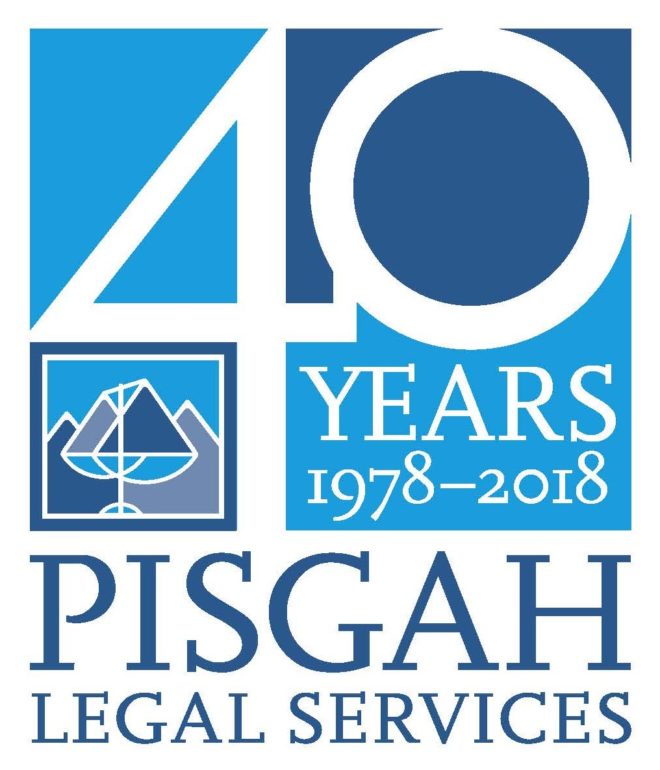 Over the past 40 years, Pisgah Legal Services has grown from a small group of volunteer attorneys to an essential nonprofit serving 15,000+ people each year in WNC, a staunch advocate for social change that takes on difficult problems that cause or exacerbate poverty in our mountain communities. Here are a few highlights from the past four decades.
Over the past 40 years, Pisgah Legal Services has grown from a small group of volunteer attorneys to an essential nonprofit serving 15,000+ people each year in WNC, a staunch advocate for social change that takes on difficult problems that cause or exacerbate poverty in our mountain communities. Here are a few highlights from the past four decades.
You can also see a timeline of major events in our past 40 decades and a list of the nonprofits we’ve helped with start-up support over the years.
One – Increasing Access to Justice in WNC: Pisgah Legal Services Begins
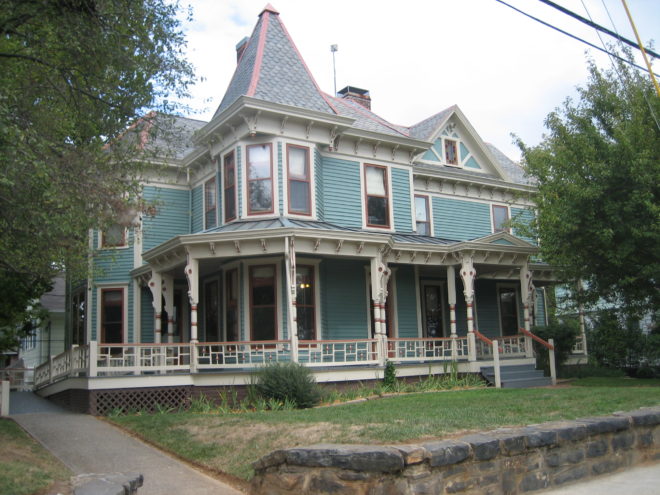
The Gudger House
In the late 1960s, volunteer attorneys formed The Legal Aid Society of Buncombe County to help low-income people in need of legal assistance. In the 1970s, a referral system was formalized, sending cases to attorneys who represented clients for free or “pro bono.” A $122,040 Legal Services Corporation grant made it possible for the Buncombe County Bar Association to use staff attorneys and members of the Bar. In the early 1980s, services were expanded to Henderson, Madison, Polk, Rutherford and Transylvania counties and a historic home located in Asheville’s Montford community – The Gudger House – was purchased and adapted for office use. The Legal Aid Society changed its name to Pisgah Legal Services.
♦
Two – Harnessing the Power of Pro Bono: Attorneys Give Back
In 1983, the Mountain Area Volunteer Lawyer (MAVL) Program began formally – a program administered by Pisgah Legal Services in which low-income clients are screened and then matched with local volunteer attorneys who provide services at no cost or pro bono.
Over the years, the MAVL program has grown to become one of the best examples of legal aid pro bono partnerships in NC and the United States. Approximately 300 attorneys volunteer to assist Pisgah Legal clients today. In 2017 alone, WNC attorneys donated 3,176 hours, a value of $794,083.
Hear attorney Jacqueline Grant talk about why she volunteers:
♦
Three – Staying True to Our Roots and Remaining Local
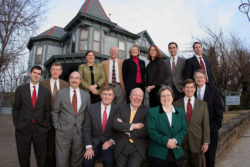
The “Dream Team” in 2005
In 1998, Pisgah Legal Services declined to merge with Legal Services of North Carolina. As a result, LSNC terminated funding which resulted in major funding losses. Undaunted, Pisgah Legal stepped up efforts to raise more funds locally and even expanded services to the poor in our mountain region by remaining an independent, community-based nonprofit.
In 2005 the federal Legal Services Corporation sued Pisgah Legal Services for ownership of The Gudger House. A “dream team” of local attorneys came together ready and eager to defend PLS. Thanks to their extraordinary efforts, in 2005 the federal lawsuit was settled, securing a clear title to The Gudger House for Pisgah Legal Services.
♦
Four – Expanding to Reach More People in Our Mountain Region
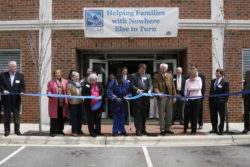
Ribbon Cutting at 62 Charlotte in 2009
Western North Carolina is a large, rural area and transportation can be one of our clients’ greatest barriers to service. With that in mind, Pisgah Legal has expanded access and local support. PLS now operates in 11 different locations, and has offices in Asheville, Hendersonville, Rutherfordton, Brevard, and Marshall.
Our greatest expansion effort began in 2007 when leaders decided to launch a Capital Campaign to purchase a larger main office. Although The Gudger House was a beloved part of the organization’s history, the old Victorian couldn’t house the growing staff and volunteers. The lack of usable office space was hindering Pisgah Legal’s ability to effectively serve and expand.
The campaign coincided with a crippling recession, but the community rallied nonetheless, raising $5 million from 2007-09 to purchase 62 Charlotte Street in Asheville. With this expansion, and that of the satellite offices, Pisgah Legal now serves 70% more clients annually.
♦
Five – Working for the Greater Good
Not only does Pisgah Legal Services provide direct services and legal representation to thousands of individuals and families in crisis each year, PLS works to improve public policies to help our clients, secure funding for WNC, and partner with other nonprofits on complex problems of poverty.
For example, Pisgah Legal helped create minimum housing codes for Buncombe and Henderson counties and Brevard, and advocated for their enforcement.
PLS was also there when health insurance became available through the Affordable Care Act in 2013, helping local people understand the new law and sign up for health insurance. We have continued to assist people who would be without health insurance if not for the ACA.
Pisgah Legal has also fought – in local and state cases – to:
- Improve NC’s process for disbursement of child support payments
- Expand and protect phone services in Madison County’s remote areas
- Defend the constitutionality of a statute that empowers victims of domestic violence as they pursue protection orders in court
- Change Medicaid rules in NC so that parents who have adopted children with mental health issues don’t have to return them to DSS in order to receive treatment
- Improve zoning rules in Buncombe County to encourage development of affordable housing
And so much more…
♦
Six – Drawing Attention to Complex Problems of Poverty
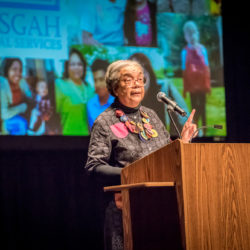
Marian Wright Edelman. (Jesse Kitt photo)
Since 2011, Pisgah Legal Services has hosted an annual Poverty Forum, bringing thousands of people in our mountain communities together to learn, discuss and explore the problems of poverty. The Forums have been led by dynamic speakers, including:
2011 – Gene Nichol, Boyd Tinsley Distinguished Professor of Law, UNC School of Law
2012 – Peter Edelman, Professor at Georgetown University Law Center, and Faculty Director, Center on Poverty and Inequality
2013 – Kim Gandy, President and CEO of the National Network to End Domestic Violence
2014- Sister Simone Campbell, Executive Director of NETWORK
2015 – Dr. Rishi Manchanda, President and Founder of Health Begins
2016 – Marian Wright Edelman, President and Founder of The Children’s Defense Fund
And in 2017, more than 1,000 people gathered at UNCA to hear Pulitzer Prize Winner Matthew Desmond, Ph.D. and author of “Evicted: Poverty and Profit in the American City”. The following day, developers and community leaders gathered for a Housing Summit to drill down on new ways to create affordable housing.
♦
Seven – Partnering with Others to Serve WNC Better
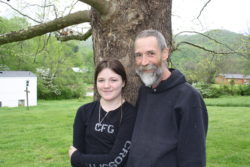
In 2017, Pisgah Legal attorneys assisted James who was diagnosed with a terminal brain tumor. James needed legal assistance to put his affairs in order so that his young daughter would be cared for by the legal guardian he chose and not be put into foster care after his death. James came to PLS through the medical-legal partnership with Mission Health.
Over the years, Pisgah Legal Services has worked in partnership with a host of other nonprofits, funders, city and county governments, and many others to address critical issues that impact people who are struggling in our mountains.
For example, medical-legal partnerships include lawyers as part of a team of specialists working in health care settings to assist people in need. Patients are referred to Pisgah Legal, and attorneys can consult with medical staff about other barriers to care. Over the years, Pisgah Legal has worked in partnership with Mission Health, MAHEC, Blue Ridge Community Health Services, RHA Health Services, and now Hot Springs Health Program.
From United Ways, to community foundations, medical providers, private donors and local government leaders – – we thank you for believing in this important work and partnering with us.
♦
Eight – Assisting Other Nonprofits
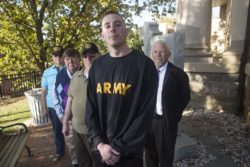
Army Vet Gage and the founders of Corpoint. (Matt Rose photo, Bold Life)
Pisgah Legal has assisted more than 20 WNC nonprofits with start-up support over the past 40 years.
Last year, a new Henderson County nonprofit, Corpoint, needed assistance. This group works with veterans to provide coaching, mentoring and support so that they can maximize educational benefits provided by the GI Bill.
Corpoint President Richard Starkweather said, “Pisgah Legal was instrumental in advising us about all of the steps necessary to establish our nonprofit with both the IRS and North Carolina. They spent a considerable amount of time preparing all of the legal documentation and helping us make many decisions regarding our operation.”
♦
Nine – Addressing Changing Needs in Our Region
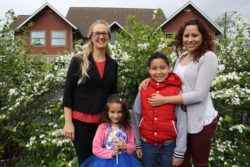
Over the years as the mountain region has changed, Pisgah Legal has adapted to meet those needs. Our programs target the most vulnerable people, including children, the elderly, veterans, victims of abuse, and people with disabilities.
A few years back, as domestic violence homicides in parts of WNC reached record levels, Pisgah Legal joined with new Family Justice Centers in Buncombe and Henderson counties. This year yet another center will open in Transylvania County. PLS attorneys work on site in conjunction with law enforcement, counselors and other nonprofits to reduce domestic violence and child abuse.
In 2017, as immigration policies changed, panicked immigrants turned to Pisgah Legal for help. Swamped with requests for assistance, we reached out to donors who responded by generously funding a second immigration attorney for 17 WNC counties.
♦
Ten – Preparing for the Future
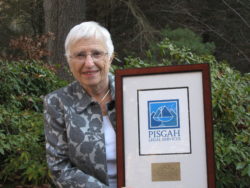
Carola Cohn: 1928 – 2017
While we celebrate 40 years of standing for justice and dignity for people in WNC, Pisgah Legal Services must also look to the future.
With state and federal funding in jeopardy, we must build a stable resource that will ensure legal aid is provided to people in our mountains for generations to come. We need a substantial endowment fund to supplement local support.
Carola Cohn (shown here) was one of four volunteers who helped start Pisgah Legal’s office in Henderson County. She died in 2017, but left a lasting legacy by including Pisgah Legal Services in her will and estate plan.
Find out more about making a lasting gift to Pisgah Legal Services.
